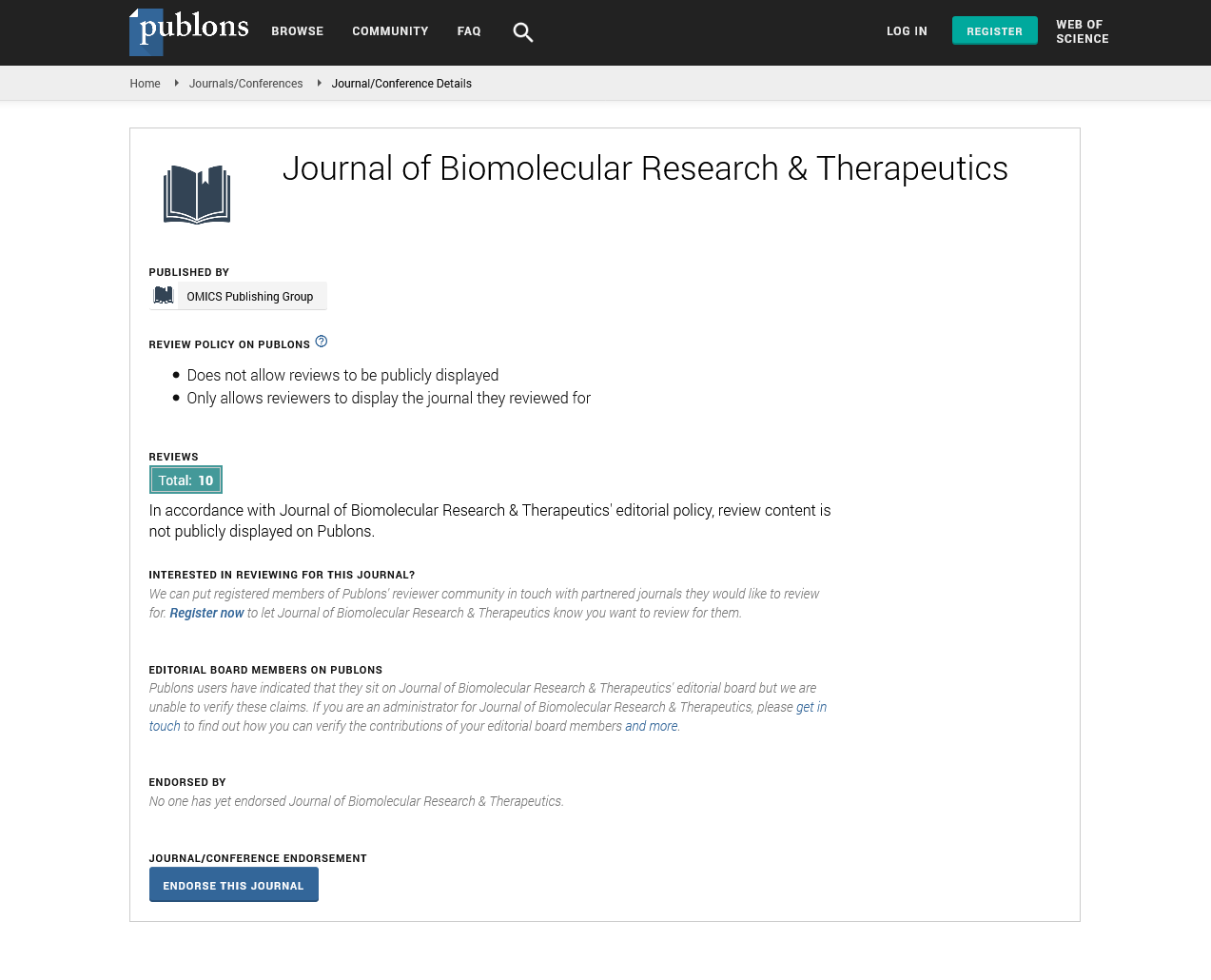Indexed In
- Open J Gate
- Genamics JournalSeek
- ResearchBible
- Electronic Journals Library
- RefSeek
- Hamdard University
- EBSCO A-Z
- OCLC- WorldCat
- SWB online catalog
- Virtual Library of Biology (vifabio)
- Publons
- Euro Pub
- Google Scholar
Useful Links
Share This Page
Journal Flyer

Open Access Journals
- Agri and Aquaculture
- Biochemistry
- Bioinformatics & Systems Biology
- Business & Management
- Chemistry
- Clinical Sciences
- Engineering
- Food & Nutrition
- General Science
- Genetics & Molecular Biology
- Immunology & Microbiology
- Medical Sciences
- Neuroscience & Psychology
- Nursing & Health Care
- Pharmaceutical Sciences
Perspective - (2023) Volume 12, Issue 12
Exploring the Significance of Growth Factors in Biomolecular Research
Robin Keller*Received: 06-Nov-2023, Manuscript No. BOM-23-24333; Editor assigned: 08-Nov-2023, Pre QC No. BOM-23-24333; Reviewed: 30-Nov-2023, QC No. BOM-23-24333; Revised: 07-Dec-2023, Manuscript No. BOM-23-24333; Published: 14-Dec-2023, DOI: 10.35248/2167-7956.23.12.357
Description
Biomolecular research is a dynamic and rapidly evolving field that seeks to understand the involved mechanisms main life at the molecular level. The significance of this exploration lies the concept of growth factors, signaling molecules that play acute roles in cellular development, tissue regeneration, and the maintenance of homeostasis. This article delves into the captivating domain of growth factors, on their significance in biomolecular research and their implications for human health. Growth factors are a diverse group of proteins that regulate various cellular processes, such as cell proliferation, differentiation, and survival. These molecules act by binding to specific cell surface receptors, initiating intracellular signaling cascades that ultimately dictate the cellular response. The discovery of growth factors has been instrumental in decoding the complexities of cell biology, insights into embryonic development, tissue repair, and the pathophysiology of diseases.
Classification of growth factors
Epidermal Growth Factor (EGF) Transforming Growth Factor- Alpha (TGF-α), and amphiregulin are examples. Key role in epithelial cell growth and development. Fibroblast Growth Factor (FGF) contribute to angiogenesis, wound healing, and tissue repair. Implicated in limb development during embryogenesis. Platelet-Derived Growth Factor (PDGF) is vital for blood vessel formation and tissue repair. Aberrant PDGF signaling linked to fibrotic diseases. Transforming Growth Factor-Beta (TGF-β) regulates cell growth, immune response, and tissue homeostasis. Dysregulation associated with cancer and autoimmune disorders. Insulin-Like Growth Factor (IGF) plays a role in growth, metabolism, and development. Implicated in disorders like acromegaly and gigantism.
Role of growth factors in development
Embryonic development is a finely composed process involving complex signaling pathways and the precise regulation of cell fate. Growth factors act as molecular architects, guiding cells through differentiation, migration, and organogenesis. For instance, Sonic hedgehog (Shh) signaling is vital for the development of the central nervous system, while Bone Morphogenetic Proteins (BMPs) play a pivotal role in skeletal development. Disruptions in these signaling pathways can lead to congenital abnormalities and developmental disorders.
Growth factors in tissue regeneration
Beyond development, growth factors also play a vital role in tissue repair and regeneration. For instance, during wound healing, platelets release growth factors like PDGF, initiating a cascade of events that promote cell migration, proliferation, and the formation of new blood vessels. Harnessing the regenerative potential of growth factors has therapeutic implications, with ongoing research exploring their use in promoting tissue repair after injuries or surgeries. While growth factors are essential for normal cellular processes, their dysregulation can contribute to the pathogenesis of various diseases. Aberrant signaling is often associated with cancer, where uncontrolled cell proliferation and survival are seals of the disease. For example, overexpression of Epidermal Growth Factor Receptor (EGFR) is observed in many cancers, making it a target for anti-cancer therapies. Similarly, deregulated TGF-β signaling has been implicated in fibrotic diseases, where excessive tissue scarring disrupts organ function. Understanding the complex balance of growth factor signaling in health and disease is an acute aspect of biomolecular research, present potential therapeutic paths for a wide range of medical conditions.
Applications of growth factors
The profound impact of growth factors on cellular processes has prompted their exploration as therapeutic agents. Recombinant growth factors, such as erythropoietin and Granulocyte Colony- Stimulating Factor (G-CSF), are used in clinical settings to stimulate the production of red and white blood cells, respectively. Additionally, growth factors are being investigated for their potential in regenerative medicine, with applications in tissue engineering and the treatment of degenerative diseases. In conclusion, growth factors stand as key orchestrators of cellular processes in biomolecular research. From embryonic development to tissue repair and disease pathogenesis, these signaling molecules play multifaceted roles in shaping the landscape of cellular biology. As our understanding of growth factor signaling deepens, so too does the potential for innovative therapeutic interventions in areas such as regenerative medicine and cancer treatment. The path into the dominion of growth factors continues to regenarate the life at the molecular level, plot potential for transformative advancements in the field of biomolecular research.
Citation: Keller R (2023) Exploring the Significance of Growth Factors in Biomolecular Research. J Biol Res Ther. 12:357.
Copyright: © 2023 Keller R. This is an open access article distributed under the terms of the Creative Commons Attribution License, which permits unrestricted use, distribution, and reproduction in any medium, provided the original author and source are credited.

